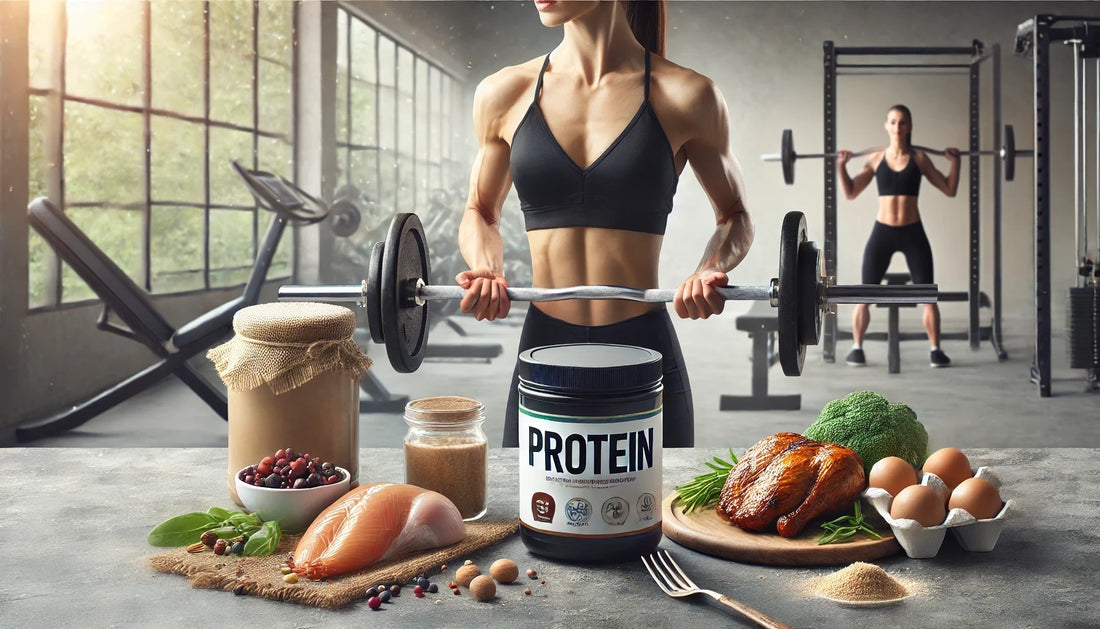
The Power of Protein: Why It’s Essential for Fat Loss and Muscle Gain
The Power of Protein: Why It’s Essential for Fat Loss and Muscle Gain
When it comes to achieving your fitness goals—whether that’s shedding unwanted fat or building lean muscle—there’s one macronutrient you can’t overlook: protein. You’ve probably heard of its benefits before, but do you really know why protein is crucial for both fat loss and muscle gain? In this post, we’ll break down the science behind protein’s role in your fitness journey and how you can make the most of it in your diet.
Protein and Fat Loss: A Dynamic Duo
Many people focus solely on cutting calories when trying to lose fat, but it’s just as important to pay attention to the quality of the food you’re eating—especially protein. Here’s why:
1. Boosts Metabolism
Protein has a high thermic effect, meaning your body burns more calories digesting and metabolizing protein compared to carbs and fats. This slight boost in metabolism can help you burn more calories throughout the day, even when you’re not working out.
2. Curbs Appetite
Eating protein-rich meals can help you feel full for longer periods, reducing hunger and cravings. This makes it easier to stick to your calorie deficit and avoid overeating. Protein reduces levels of the hunger hormone ghrelin while increasing levels of peptide YY, a hormone that makes you feel satisfied.
3. Prevents Muscle Loss
When you’re in a calorie deficit, your body may break down muscle for energy. Consuming enough protein can help preserve muscle mass, ensuring that the weight you lose comes from fat rather than muscle. This is crucial for maintaining a toned, lean physique.
Protein and Muscle Gain: The Building Blocks of Strength
If your goal is to gain muscle, protein is even more important. Muscles are made of protein, and without enough of it, your body can’t effectively repair and grow stronger after a workout. Here’s how protein helps with muscle gain:
1. Promotes Muscle Repair and Growth
After a strength training session, your muscles experience tiny tears. Protein provides the essential amino acids needed to repair these tears, leading to muscle growth. Consuming protein shortly after your workout can enhance muscle protein synthesis, helping your muscles grow bigger and stronger.
2. Supports Recovery
Muscle soreness is common after a tough workout, but protein can help speed up recovery. The amino acids in protein aid in repairing muscle tissue, reducing soreness, and helping you get back to your next workout faster.
3. Optimizes Muscle Protein Synthesis
To build muscle effectively, your body needs a steady supply of protein. Spacing your protein intake throughout the day (such as including protein in each meal) ensures that your muscles constantly receive the nutrients they need to grow.
How Much Protein Do You Need?
For fat loss, a good rule of thumb is to consume around 0.8–1.2 grams of protein per pound of body weight. If you’re aiming to build muscle, you may need to increase this to 1.0–1.5 grams per pound of body weight.
Of course, everyone’s needs are different depending on their activity level, age, and overall goals, so don’t hesitate to consult with a personal trainer or nutritionist to customize your intake.
Best Sources of Protein
It’s not just about how much protein you eat, but also the quality. Here are some of the best sources of high-quality protein:
• Lean meats (chicken, turkey, lean beef)
• Fish and seafood (salmon, tuna, shrimp)
• Eggs
• Dairy products (Greek yogurt, cottage cheese)
• Plant-based options (tofu, tempeh, lentils, chickpeas)
• Protein supplements (whey protein, plant-based protein powder)
Conclusion: Make Protein a Priority
Whether you’re working towards fat loss, muscle gain, or both, protein should be at the center of your nutrition plan. By helping you burn more calories, control your appetite, preserve muscle, and enhance recovery, protein is the key to reaching your goals faster and more effectively. So, the next time you plan your meals, don’t forget to prioritize your protein intake—it’s the building block of your success.
When it comes to achieving your fitness goals—whether that’s shedding unwanted fat or building lean muscle—there’s one macronutrient you can’t overlook: protein. You’ve probably heard of its benefits before, but do you really know why protein is crucial for both fat loss and muscle gain? In this post, we’ll break down the science behind protein’s role in your fitness journey and how you can make the most of it in your diet.
Protein and Fat Loss: A Dynamic Duo
Many people focus solely on cutting calories when trying to lose fat, but it’s just as important to pay attention to the quality of the food you’re eating—especially protein. Here’s why:
1. Boosts Metabolism
Protein has a high thermic effect, meaning your body burns more calories digesting and metabolizing protein compared to carbs and fats. This slight boost in metabolism can help you burn more calories throughout the day, even when you’re not working out.
2. Curbs Appetite
Eating protein-rich meals can help you feel full for longer periods, reducing hunger and cravings. This makes it easier to stick to your calorie deficit and avoid overeating. Protein reduces levels of the hunger hormone ghrelin while increasing levels of peptide YY, a hormone that makes you feel satisfied.
3. Prevents Muscle Loss
When you’re in a calorie deficit, your body may break down muscle for energy. Consuming enough protein can help preserve muscle mass, ensuring that the weight you lose comes from fat rather than muscle. This is crucial for maintaining a toned, lean physique.
Protein and Muscle Gain: The Building Blocks of Strength
If your goal is to gain muscle, protein is even more important. Muscles are made of protein, and without enough of it, your body can’t effectively repair and grow stronger after a workout. Here’s how protein helps with muscle gain:
1. Promotes Muscle Repair and Growth
After a strength training session, your muscles experience tiny tears. Protein provides the essential amino acids needed to repair these tears, leading to muscle growth. Consuming protein shortly after your workout can enhance muscle protein synthesis, helping your muscles grow bigger and stronger.
2. Supports Recovery
Muscle soreness is common after a tough workout, but protein can help speed up recovery. The amino acids in protein aid in repairing muscle tissue, reducing soreness, and helping you get back to your next workout faster.
3. Optimizes Muscle Protein Synthesis
To build muscle effectively, your body needs a steady supply of protein. Spacing your protein intake throughout the day (such as including protein in each meal) ensures that your muscles constantly receive the nutrients they need to grow.
How Much Protein Do You Need?
For fat loss, a good rule of thumb is to consume around 0.8–1.2 grams of protein per pound of body weight. If you’re aiming to build muscle, you may need to increase this to 1.0–1.5 grams per pound of body weight.
Of course, everyone’s needs are different depending on their activity level, age, and overall goals, so don’t hesitate to consult with a personal trainer or nutritionist to customize your intake.
Best Sources of Protein
It’s not just about how much protein you eat, but also the quality. Here are some of the best sources of high-quality protein:
• Lean meats (chicken, turkey, lean beef)
• Fish and seafood (salmon, tuna, shrimp)
• Eggs
• Dairy products (Greek yogurt, cottage cheese)
• Plant-based options (tofu, tempeh, lentils, chickpeas)
• Protein supplements (whey protein, plant-based protein powder)
Conclusion: Make Protein a Priority
Whether you’re working towards fat loss, muscle gain, or both, protein should be at the center of your nutrition plan. By helping you burn more calories, control your appetite, preserve muscle, and enhance recovery, protein is the key to reaching your goals faster and more effectively. So, the next time you plan your meals, don’t forget to prioritize your protein intake—it’s the building block of your success.
